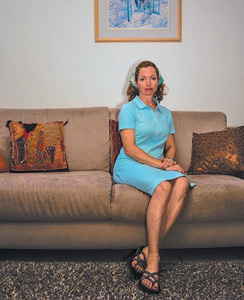

Orthodox women who sued the municipality of Beit Shemesh have won their case. Judge David Gidoni found that the “modesty” signs posed in the town violated these women’s civil rights, and fined Beit Shemesh NIS 60,000 for refusing to take them down.
In a statement released by the Israel Religious Action Center (IRAC) who represented the women in court, Judge David Gidoni, in a 25-page decision, found that the municipality of Beit Shemesh was “grossly negligent” for refusing to remove street signs telling women where they can and can’t walk, and what they can and can’t wear. The Attorney General ruled last June that the signs were illegal.
Here are several quotes from the decision, the first of its kind in Israel:
“The signs were designed to restrict women from using public spaces simply because they were women… and constitute a severe injury to the rights of women to equality and respect. The signs are humiliating.”
“The signs create the expectation that they should be adhered to. They are likely to create the expectation or understanding that the area where the sign is placed belongs, in effect, to one specific population group in which its norms are applicable.”
“This expectation is likely in certain circumstances to encourage and assist the creation of a social atmosphere in which one could interpret the signs as obligating a person to obey them and even to bring about enforcement activities, sometimes through violence.”
The signs “bear an injurious and discriminatory message,” and “discriminate against women because they are women,” as well as cause “a severe injury to human dignity, equality and free choice and independence.”
The town must also pay court costs to the four Orthodox women in this case: Nili Philipp, Eve Finkelstein, Miriam Friedman Zussman, and Rachely Yair Schloss. Nili said the decision…”has restored my faith in democracy and law and order…
“I hope it sets an important precedent in municipalities across the country, and in places like bus stations, public health clinics, banks and post offices, so that other women will not have have to suffer the indignities that I did walking down the streets of Beit Shemesh.
The Attorney General ruled last June that the signs were illegal but Beit Shemesh claimed they did not remove the signs because they feared a violent backlash from the ultra-Orthodox community. Does the fear of lawless violence justify illegal discrimination? The judge didn’t think so. Allowing some places to be above the law, Judge Gidoni ruled, “rewards violence,” and encourages even more violence.
Perceived threats of violence by angry ultra-Orthodox men do not absolve the municipality from its obligation to remove signs that create an atmosphere fueling actual violence directed at women walking down the streets.
Jews from different streams of Judaism, from Orthodox to Reform, partnered to achieve the victory. Philipp said she worked with IRAC because, “They are on the forefront of issues like these. I don’t have to agree with everything the Reform Movement says or does in order to work together with them on issues we agree on. There were people in my community who were skeptical about my decision to work with IRAC because it is part of the Reform Movement. But if I waited to get everyone’s approval about things like these, I would still be sitting in the back of the bus.”
The court’s decision joins a growing list of powerful rulings upholding women’s rights in the public sphere: on the radio, at cemeteries, at the Western wall and on buses. According to IRAC, the threat of damages for these kinds of violations will deter illegal conduct by local governments and their officials.
By JLNJ Staff













